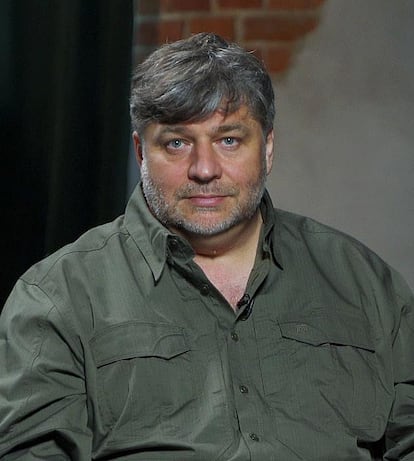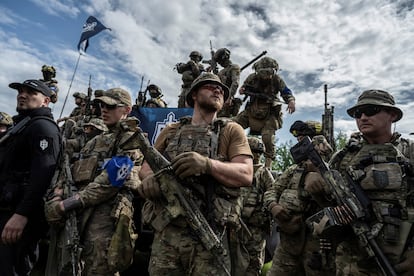‘The alliance of Ukrainians and Russians fighting against Putin is forged in blood’
Denis Sokolov is in charge of recruiting volunteers from Russia willing to fight in Ukraine’s International Legion against the invading Kremlin forces

“The alliance of Ukrainians and Russians fighting against Putin is forged in blood,” says Denis Sokolov, who oversees the recruitment of Russians willing to fight under the orders of the Ukrainian Defense Ministry’s Main Directorate of Intelligence (GUR). Russian fighters claim to have been involved in the recent saboteur raids in Belgorod, a Russian province bordering Ukraine.
Originally from St. Petersburg, Sokolov worked as an anthropologist in the Caucasus before going into exile. Today, he operates through a platform called the Citizens’ Council (CC), where he coordinates the reception and transfer of Russians wishing to enlist in Ukraine’s International Legion.
From Warsaw, Sokolov spoke to EL PAÍS through a social network — the same one that the CC openly uses for recruitment. Solokov, an activist supporter of the armed struggle, provides a glimpse into the internal relations of the volunteer groups and their links with the GUR. Data on the number of members in these armed Russian contingents and the chain of command to which they answer are difficult to verify. Neither do the standard military designations of battalion, regiment or corps provide any information on the number of volunteers they include.
The International Legion of Ukraine, subordinated to the GUR, consists of units of various origins, among them volunteers from countries that were formerly part of the USSR, such as Georgia or Belarus. Those coming from Russia, for the most part, have been integrated into the Russian Volunteer Corps (RDK).
The RDK, however, “left the Citizens’ Council by mutual agreement, because it did not comply with the principles of the manifesto we had signed [respect for the European Convention on Human Rights],” says Sokolov, who does not wish to delve into the discrepancies. He admits, however, that they concerned “the attitude of that body toward Muslims, toward other nationalities, and toward sexual minority groups.” The RDK was founded by Denis Kapustin (also known as Denis Nikitin), a far-right activist who since 2019 has been banned from entering the European Schengen area.
“Because of its ideology, the RDK rejected Vladislav Amosov, a former officer in the Russian Armed Forces, who is of Yakut origin [an ethnic group from the Siberian Republic of Sakha-Yakutia],” explains Sokolov. Hence, the Siberian battalion was formed, which is led by Amosov and includes Ildar Dadin, the first activist to be sentenced to a prison term in Russia (in 2015) for violating the rules governing demonstrations and picketing.
“The far-right attitude of the RDK is a deterrent, even for right-wing volunteers, let alone liberals,” says Sokolov. “Russian fascism has relegated Russian nationalism to the periphery and prevents the formation of a national and regional identity acceptable to the majority of Russian society.”
Mykhailo Podolyak, an advisor to President Volodymyr Zelenskiy, has distanced himself from the armed incursions into Russia. According to Podolyak, the Russians involved had already concluded their contracts with the Ukrainian Armed Forces. He did acknowledge, however, that the saboteur units use Ukrainian terrain for their activities.
Sokolov is reticent about the so-called Russian “democratic forces” which, from exile, declare themselves against Moscow’s war in Ukraine. The leaders of these groups, he points out, are linked to the exiled Russian oligarchs, who “maintain their relations with members of the security services and officials of the justice and administration apparatus and believe that the future of Russia will be the result of a schism in the elite that holds power.”
The raids on Belgorod, which forced the evacuation of several Russian villages on the border, showed, according to Sokolov, that “the Russian command mechanism is very slow,” that “it lacks manpower” and “it does not care about bombing its own cities and villages.”
The Siberian battalion is already “a full-fledged combat unit built on political, regional and national principles,” Sokolov says, and “will be completed as volunteers arrive from the various regions of Siberia.” The battalion is supported, he adds, by “small- and medium-sized business owners and exiled professionals who pay for training and maintenance.” It is based on the model of “a people’s army of volunteers similar to the territorial defense battalions that emerged in 2014 in Ukraine [during the Donbas conflict].”
“Initially, the only enlistment option was the RDK, but now the vast majority of recruitment requests go to the Siberian battalion, which accepts people from other Russian regions. From the point of view of a broad military-political project, the Siberian battalion is the one with the best prospects.”
“I can’t say how many there are [in the Siberian battalion],” he says. When pressed, Sokolov admits that the target of 300 members has not yet been reached. For the “many more who want to come,” he explains, the main problem is transit from Russia to Ukraine via third countries. “If that is resolved, the number of volunteers will be much higher.”

“Our volunteers are people who put their convictions and freedom above life and comfort”
But it is not just a question of circuitous routes to reach Ukraine, but also of distrust among Ukrainians of those they view as a suspicious contingent. “Once they are approved, the volunteers receive weapons, equipment and salary, depending on their contract,” Sokolov says. “Their level of readiness differs; there are those who have military experience and those who do not.” For exiled liberal democrats, “the road from the couch to the trenches is somewhat longer, although many walk it.” There is a substantial difference between those who fight and the politicians and ex-oligarchs who “manipulate the democratic sectors in exile and who see armed resistance as a matter of mercenaries, terrorists and traitors.” The position of the latter is to “let Ukraine win and then build a democracy through elections. Our volunteers are very different; very young, people who put their convictions and freedom above life and comfort,” Sokolov states.
“Europeans are afraid that Russia will disintegrate. No one wants to directly witness the Russian Federation cease to exist, to see it become a failed state. Whether or not it wins the war, Russia will collapse as a state and internecine wars will begin. We have to think about what to build in place of this monster,” he says. “The alternative is decided at the front,” Sokolov adds, but he believes “the time has not come yet.”
“The attitude of Ukrainians towards us is forged in blood, and we will be able to say that we are allies when they understand that for every one of the fallen Russians a Ukrainian life is saved. Ukrainians will be ready to see other Russians when other Russians appear; when there is an alternative project [in Russia]. Ukraine needs us because it lacks people, because we are its reserve. Ukraine needs Russians, but other Russians, ready to die for its freedom.”
Sign up for our weekly newsletter to get more English-language news coverage from EL PAÍS USA Edition
Tu suscripción se está usando en otro dispositivo
¿Quieres añadir otro usuario a tu suscripción?
Si continúas leyendo en este dispositivo, no se podrá leer en el otro.
FlechaTu suscripción se está usando en otro dispositivo y solo puedes acceder a EL PAÍS desde un dispositivo a la vez.
Si quieres compartir tu cuenta, cambia tu suscripción a la modalidad Premium, así podrás añadir otro usuario. Cada uno accederá con su propia cuenta de email, lo que os permitirá personalizar vuestra experiencia en EL PAÍS.
¿Tienes una suscripción de empresa? Accede aquí para contratar más cuentas.
En el caso de no saber quién está usando tu cuenta, te recomendamos cambiar tu contraseña aquí.
Si decides continuar compartiendo tu cuenta, este mensaje se mostrará en tu dispositivo y en el de la otra persona que está usando tu cuenta de forma indefinida, afectando a tu experiencia de lectura. Puedes consultar aquí los términos y condiciones de la suscripción digital.









































